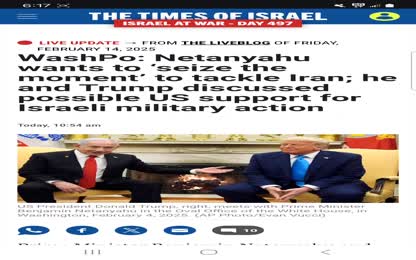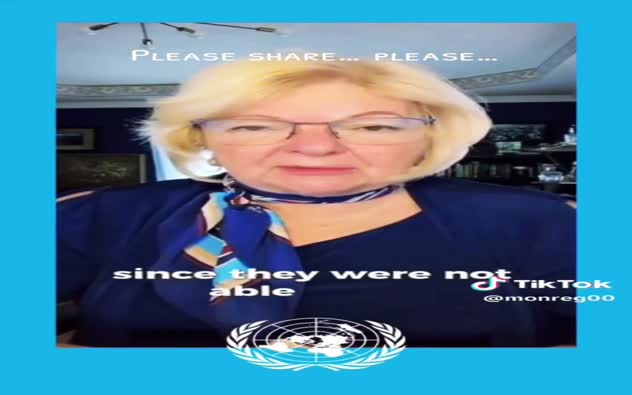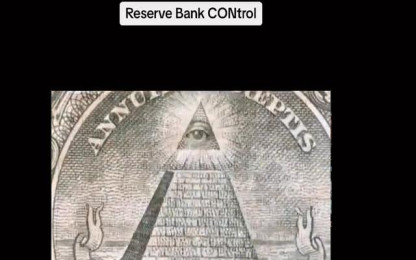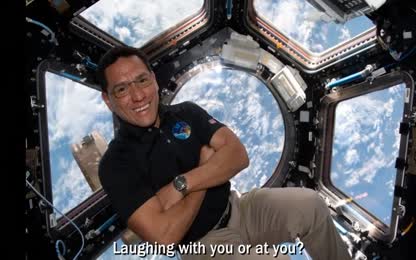Advertisement
The Bank’s Musical Chairs
The Bank’s Musical Chairs with a commentary from:
Ron DeSantis on the Fed and CBDC
- Category: Government Lie,Government Tyranny /Oppression,Selling BS,Zionism
- Duration: 17:21
- Date: 2023-03-21 21:55:20
- Tags: cbdc fed desantis
4 Comments
Video Transcript:
MUSIC your this here and you and There is a new concern in the banking sector this morning following the failure of multiple banks this month. First Republic until recently, the 14th largest bank saw it shares plunge yesterday despite a $30 billion lifeline from 11 other banks. The news comes as the Federal Reserve is considering another interest rate hike. I don't know how other people solve their problems, but when I find that something isn't working, especially after repeated failures, I find it necessary to look for a different solution. The Federal Reserve, after raising interest rates many times recently, is going to give it another try. Jill Slesinger joins us now to talk about it. Jill, good morning. Good morning. So, front page of the Wall Street Journal, Diamond, as in Jamie. Are you afraid that people may recall the name of the full Jamie Diamond? The idiot who was part of the crew who screwed up the banking system in 2008. And still has his fingers in the pie? As head of JP Morgan Chase. Diamond oversaw the transfer of $25 billion in funds from the US Treasury Department to the bank on October 28, 2008. Under the troubled asset relief program, TARP. Pursues more aid for First Republic. It's on the brink of collapse. Should people be worried? Well, I think we have to all be worried about this. This is not something we encounter where medium-sized banks of a couple hundred billion dollars in assets are having runs on their asset base. But here's what I think is important. First Republic, like Silicon Valley Bank, had this large percentage of uninsured deposits, meaning a lot of people had accounts with more than the $250,000 FDIC insurance limit. One has to wonder. What fool would deposit money over the insurance limit of $250,000? Even though there is ample evidence that not even $250K is covered. On second thought, there may be a cognitive reason. Now as other banks were failing, remember that the Fed came in and Treasury Department said we're going to ensure everybody. Everyone more than $250,000. But they haven't made that similar announcement for other banks. That means that despite 11 banks putting $30 billion into first republic, $70 billion have left that bank this month. Could it be that some are getting the message and are losing trust in the banking system? And I think that that's what's caused for concern. The idea that maybe these 11 banks that which put $30 billion in may try to do something to help the bank out, that's actually good. And also we have comments that were just released where Janet Yellen is going to deliver a speech later today. What a relief it will be to hear Janet Yellen's words of wisdom. Our problems are close to being solved. And there is sort of an implicit comment that she put out that said, hey, if other banks that are systemically important run into a problem, we're probably going to backstop those folks over $250. All right, let's talk about the Fed which is meaning today to decide whether or not to raise interest rates again. Will that what are you hearing? Well, the idea here is that inflation still remains high. Okay, we know that. And the Federal Reserve is very clear they need to fight inflation. The inflation rate 6% year over year. Now the problem is with the instability in the banking system, a lot of people are saying, hey, go on pause, just wait, chill out for a meeting. The problem is I think that if the Fed were to do that, it sends a signal that they are spooked about what's going on. Could it be that the signal that Fed is really worried about? Is that what they've done so far? Was the wrong thing to do? And if we are really believing that this is mostly about confidence and we need to shore confidence, I hear that the most likely path for this two-day meeting is a quarter of a percentage point increase. Whether or not you think that's good or bad, I think that's what's most likely, that way the Fed can sort of say, hey, we're dealing with inflation. But we're not raising rates by so much that's going to further crimp the banking system. Market seem to agree with you, it was a big yes to the ages. Thank you very much. Thank you very much. Here's some interesting information from Ron to Sanis. Should this be considered a 2024 campaign speech? As with any election, the election issues to be argued by these great leaders get framed far in advance of the election. The government also seems to enhance the pressure of these issues on the public prior to the election, until it becomes a frenzied choice by the electorate to vote for the lesser of two evils. Should we expect any different this time? Listen to this and decide for yourself. So if you look at what's happening with our economy, we had starting in 2020, a massive fiscal stimulus and that ended up being trillions and trillions of dollars over a couple years. The Fed reduced interest rates to basically zero pumped a lot of money into the economy. And that led to inflation. And I think almost anyone who was looking at what was going on over the last many years would have said that inflation was the likely result of those policies. Now the Fed itself, when it was clear that we were seeing an inflationary upturn, said that it was transitory, that this was something that would just work itself out. And so they did not act when they should have. They got behind the curve. And so as inflation continued to spike and continue to be a huge problem for our economy, they responded by hiking rates very, very rapidly, very, very quickly. It's done a lot of things to hurt a lot of people, but it has put a lot of pressure on the banking sector in particular. And so we had recently this issue with the Silicon Valley bank, which was bailed out. I mean, this is a bank that had invested in a lot of long-term bonds that were no longer profitable because the interest rates have gone up. They also did things like focus a lot on ESG and DEI and didn't do appropriate risk management. So they ended up being in a situation where they were insolvent. And so the Fed, because this is a bank that is very politically connected with people in Silicon Valley, the Fed and the Treasury Department, bailed it out. Now they try to say it's not a bailout because they say it's going to be paid for by banking fees, but who pays the banking fees, customers. So you're going to pay more for fees to do banking in order to give the Silicon Valley people a bailout. And there was not a systemic risk to the economy from this one bank, but they were politically connected. And here's the thing. When you engage in those types of policies like we've seen over many years, someone is going to have to pay the bill. Ultimately, the bill comes due. And so what they've now done in the last couple of weeks is they've printed another $300 billion and injecting that into the economy. Now the problem with that is they spent the last year trying to take money out of the economy with their raising interest rates very rapidly. And so just what they've done since you've seen the hiccups in the banking is they've wiped out half of the reduction in the money supply that they had worked for the last year to achieve, all to be able to benefit some of these politically connected banks. And so what they're doing is they're quote, fighting inflation and managing the economy in ways that make it more difficult for you, for average people, but are shielding the banks from the pain associated with the policies. And my question is, are you interested in giving these economic central planners more power over our economy, more power over your daily life and your economic activity? And I answer that question, HEE double hockey sticks. No, we cannot have that happening. And so that's why we're here today because we've seen a lot of mismanagement from the economic central planners. It's just by nature, you cannot do this effectively without there being a major cost to pay. And so some want to increase power to these organizations such as the Federal Reserve. And so last year, President Biden issued an executive order to explore the creation of a U.S. Central Bank digital currency effectively converting the dollar into a centralized digital currency. And this is different than things like cryptocurrency, Bitcoin, a centralized digital currency is directly controlled and issued by the government to consumers. And it provides the government with a direct view of all consumer activities. And so this is something that is being proposed as somehow being environmentally sustainable, a way to increase access to consumers who lack the means to join a traditional bank. But as we've come to learn, any way they can get into society to exercise their agenda, they will do it. And so what the central bank digital currency is all about is surveilling Americans and controlling behavior of Americans. And how do we know because we've seen this happen in other parts of the world? Look at no further than China to see the impacts of centralized digital currency. The people's bank of China uses its central bank to monitor citizen behavior, allowing for the surveillance of spending habits and to cut off access to goods and services. You also see things in the Bahamas where they've instituted caps on CBDC holdings and transactions in Nigeria, central bank cap ATM withdrawals to forcibly push the use of their digital currency in lieu of physical currency. And I don't even need to think here, what are they going to want to do? These ESG factors. You go and buy gasoline. You bought too much gasoline. They just won't allow you to use this to make a transaction. Who knows whether they would let you buy a firearm or things that they disapprove of. And so you're opening up a major can of worms and you're handing a central bank huge, huge amounts of power. And they will use that power. I think if you've seen anything over the last four or five years is if they can do their agenda, they will do their agenda in any way that they can. I mean, just think about some of the stuff that's happened with the whole banking situation. The deposits are protected by law up to 250,000. Above that, it's not protected. Congress never changed that law. And yet somehow the administration, the Fed, the Treasury, they're removing that cap for some of these banks. And so the law is not really going to be an impediment to them if they can get the central bank digital currency. They will use that in ways that benefit their agenda. So today, we're here because we now recognize there's a concerted effort across America to backdoor provisions for the use of central bank digital currency through individual state uniform commercial codes, UCC. Uniform commercial codes intended to provide for standard governing laws for commercial transactions across state lines and is set by an independent commission of quote experts to seek uniformity and state laws. Now while legislation to apply recent recommended changes to the UCC has been introduced in about 20 states, no bill has been introduced in the Florida legislature. And if they were to pass the bill, I would veto that bill. However, given the risks associated with the federally sanctioned centralized bank of digital currency, today I'm here to call on the legislature to pass legislation to expressly forbid the use of CBDC as money within Florida's uniform commercial code. This will ensure that Florida continues to be a state that supports innovation in the financial sector through the market while protecting against government surveillance over your personal finances. But our legislation shouldn't stop there. Given the continued increase in Chinese influence in worldwide affairs and increase in plans to adopt CBDC worldwide. Our legislation also prohibits any CBDC issued by a foreign reserve or government sanctioned central bank. This will ensure that any effort to adopt a worldwide digital currency will never occur in the free state of Florida. And finally, calling on like-minded states, like Florida, to adopt similar legislation in their uniform commercial codes and to reject any changes to their uniform commercial code that would formally recognize a central bank digital currency. And I've already spoken with Lieutenant Governor of Texas, who's ahead of the Senate in Texas. I do believe Texas is going to do something similar to what Florida does. And if we can get a groundswall of states to say no, we are not going to turn over this power to you. I mean, look, ultimately, cash is king. I mean, if you can hold it in your hand, you have power over that. The minute it's all digitized, somebody else is going to have control over that. And it's just a question of, are they going to let you live your life? Are they going to decide to do things such as circumvent what you want to do? And think about what we've already seen. In Canada, you remember when the truckers were protesting the vax mandates. They had banks. The government sees some of froze some of their banks. You had charities that were trying to help these guys, and that was frozen. we've already seen government really overstep its bounds as it is in the in the banking situation and financial sector that we have now can you imagine if we went to something like a central bank digital currency so I'm glad that we're at the tip of the sphere on this I think it's really important that states stand up to fight back against some of the things that are going on well most of the things that are going on right now in Washington because they don't have your best interest at heart they have their own power at heart they have their own agenda that they're looking to advance and so I think this will be great legislation look forward we already talk into the leaders in the legislature I think this is something that is going to happen and I look forward to be able to sign it in the law later this year oh









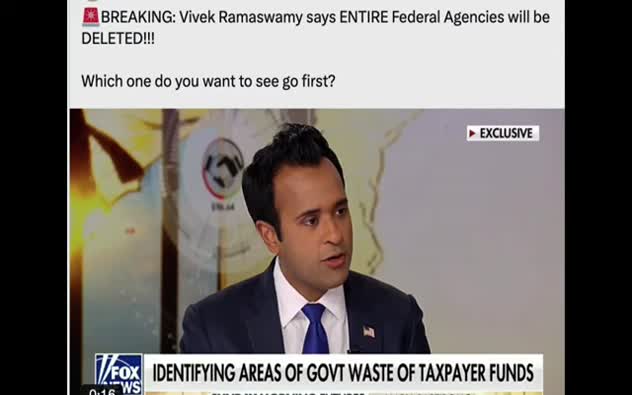
 Donate
Donate


